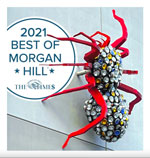
A citizens’ initiative that would require voter approval for any future lane reduction of Monterey Road through downtown Morgan Hill has gained enough valid signatures to move to the next stage of approval—either by the elected city council or the voters themselves.
Santa Clara County Registrar of Voters Shannon Bushey notified Morgan Hill City Clerk Michelle Bigelow that the initiative petition gathered 2,814 valid, sufficient signatures. That number exceeds the minimum 10% of signatures form the city’s electorate (2,796 signatures out of 27,956 registered voters) required to place the initiative on an upcoming ballot.
It is now up to the five-member city council to decide what to do next, but they still have another month or so to consider the initiative’s impact on public services, infrastructure and the local economy. Ultimately, under state election law, the council must either adopt the initiative or approve its placement as a local measure on the Nov. 8 election ballot.
The initiative petition is titled, “Citizens’ initiative amending the General Plan to require voter approval of any future Monterey Road lane reduction.” The initiative’s lead proponents are downtown Morgan Hill resident Sally Casas and local attorney Armando Benavides, also of Morgan Hill.
The initiative proponents began collecting signatures in June 2021, and submitted the petition to city staff and election officials in December. Benavides said he and other signature collectors sought and gained a total of about 3,500 signatures so they would have a “safety net” in case some of the signatures were invalid.
Bushey’s office’s full count of the signatures found that 565 signatures were not sufficient, and 159 were unverified, says a letter from Bushey to city officials.
“We’re excited that our hard work paid off, so it moves to the next phase,” Benavides said, adding, “We’re very confident that people were excited about the initiative. It just allows the voters of Morgan Hill to have a choice, and it’s a very important policy issue that impacts the whole entire Monterey Road corridor, and the city at large.”
The Morgan Hill City Council is scheduled to consider adopting a resolution certifying the initiative petition at the March 2 meeting.
Under state election law, the council has 30 days to request and complete an impact report of the initiative, which is city staff’s recommendation for the council.
If the council approves an impact report, it would have to be completed by April 1 and presented to the body at the April 6 meeting, according to a city staff report.
City staff say the initiative impact report would consider: fiscal impact of the initiative; effect on consistency with Morgan Hill’s general plan; impact on funding for infrastructure; impact on the community’s ability to attract and retain business and employment; impact on vacant parcels of land; impact on traffic congestion, existing business districts and developed areas; and other matters the council may request in the report.
After receiving such a report, the council would then have to decide to either adopt the initiative as a city ordinance by a majority vote; or place the initiative measure on the next upcoming eligible ballot, which is Nov. 8.
The city’s cost to place the initiative on the ballot is $61,502, city staff said. Other local races already scheduled for the Nov. 8 ballot are two city council seats and the mayor’s office—which will collectively cost about $197,081.
After Bigelow’s office received the citizens’ petition with all 3,500 signatures in December, city officials requested a random sampling, and then a full count of the signatures from the registrar’s office.
The narrowing of Monterey Road through the city’s downtown has become an ongoing and controversial subject of discussion at City Hall and throughout Morgan Hill. In 2015, the city conducted an experimental “road diet” that closed one lane of Monterey Road in each direction from Dunne to Main avenues.
The council in May 2021 revisited a long-term “Complete Streets/Lane Reduction Program” for the same stretch of Monterey Road, and voted 3-2 to proceed with the project. City staff and consultants have produced designs and drawings of the potential Complete Streets project, which would turn the outside lanes and street parking along Monterey Road into safer, wider passageways for pedestrians and cyclists, as well as “parklets” and outdoor patios and other amenities for businesses and the public.
In January, the council directed staff to implement a Traffic Mitigation plan, which includes re-synchronizing traffic signals along Butterfield Boulevard during rush hour; redesign of downtown traffic lanes; installation of pedestrian safety bollards; a contract for a new Property Based Improvement District for the downtown; and more details forthcoming on a possible downtown parklet program.
The council voted 3-2 to approve that plan in January, with Councilmembers Rene Spring and Yvonne Martinez Beltran in dissent.
The city’s total cost for the traffic mitigation plan is about $553,400. If city officials are pleased with the results of the plan, the council may consider adopting a lane reduction project on Monterey Road downtown this summer.







